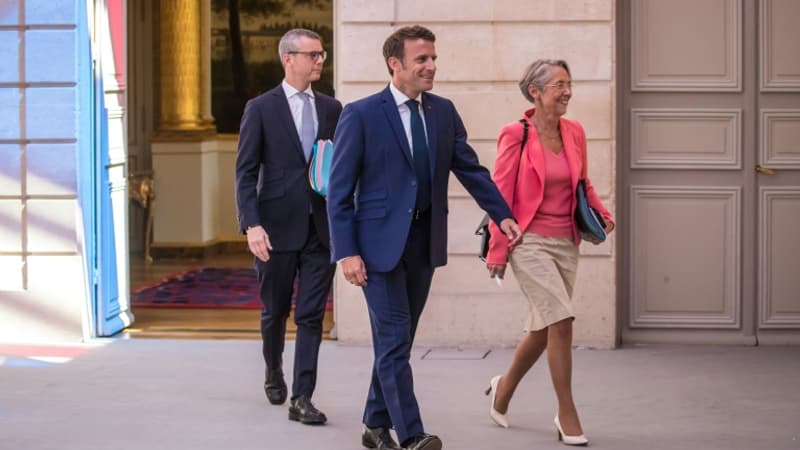More police and gendarmes, prolonged hardening of the conditions of unemployment benefits: the executive presents this Wednesday two sensitive bills to the Council of Ministers: the reform of unemployment insurance and the bill of orientation and programming of the Secretariat of Governorate (Lopmi).
With these two texts, Emmanuel Macron and his prime minister Élisabeth Borne get into the thick of this start of a five-year period, in the absence of an absolute majority, after a first more consensual exercise this summer on purchasing power, in the midst of an explosion of energy prices due in part to the war in Ukraine.
The Les Républicains party and, to a lesser extent, the Rassemblement national had thus contributed to the vote on the various articles. Some justifying that they acted in “the interest of the French” after a presidential campaign by Marine Le Pen focused on purchasing power; the others fully playing their fundamental role to make their mark with, for example, the integration into the purchasing power package of the tax exemption for overtime at 7,500 euros.
“When things go well, we tighten the rules”
This time the situation should be different. Unemployment insurance reform promises to be one of the most divisive bills with the 2023 budget, pending the highly flammable pensions bill, which the Head of State said aimed for a “first entry into force” on next summer.
The government intends to extend until 2023 the controversial compensation rules adopted in 2019, in particular for job seekers who alternate periods of work and inactivity. The executive, which has set itself the goal of full employment (that is, an unemployment rate of around 5% compared to the current 7.4%) at the end of the five-year period, wants “more incentive” rules for the resumption of use.
“When things go well, we tighten the rules, and when things go badly, we relax them,” says Labor Minister Olivier Dussopt.
LR in full internal campaign
For this first text on the Parliament’s menu at the beginning of October, the debates promise to be hectic, particularly in the Assembly with the left-wing coalition Nupes and Agrupación Nacional. The government has a more conciliatory ear from Republicans who have claimed to be in opposition. In the midst of an internal campaign, LR should seek to distance itself from the parliamentarians of the Renaissance group.
“Tomorrow we are going to vote on the budget (for the year 2023, editor’s note)? Of course not, we are in opposition,” declared Bruno Retailleau, candidate for the presidency of his party.
The same story with his competitor, Éric Ciotti.
“Let him manage this majority, we will not be his crutch,” said the deputy for the Alpes-Maritimes.
“Security is one of the priorities of the President of the Republic”
The orientation and programming bill of the Ministry of the Interior (Lopmi) foresees an additional 15,000 million euros of budget in five years for the police.
“Security is one of the priorities of the President of the Republic and of my government,” Élisabeth Borne insisted on Tuesday.
The prime minister thus mentioned a “doubling of the presence of law enforcement in public space” by 2030, a strengthening of the fight against cybercrime and “significant action in the security of major events”, from the Next year’s Rugby World Cup at the 2024 Olympics.
Elisabeth Borne announced on Tuesday “8,500 additional police and gendarme posts” in five years, including 3,000 from 2023. She also recalled that 10,000 additional police and gendarmes had already been deployed during the previous five years.
The text, which will be presented for the first time to the Senate in October, also provides for the creation of 11 mobile force units and 200 new gendarmerie brigades.
“We believe that there will be a fairly broad consensus, no one can be against the creation of a template”, we anticipate in the Ministry of the Interior.
A “stronger” judicial police
However, the Lopmi project has been reduced by half – it only has 15 articles – compared to its initial version sent to Parliament before the presidential elections. He does not understand the controversial reform of the judicial police that currently encounters the hostility of many investigators and magistrates.
This reform plans to place all the police services of a department -including the judicial police- under the authority of a single Departmental Director of the National Police (DDPN), dependent on the prefect. In July, the Minister of the Interior, Gérald Darmanin, also explained that he wanted to include provisions on the expulsion of foreign criminals in the Lopmi. Before announcing an immigration law, separate yourself from Lopmi.
“The other parts of the law are destined to be debated later (…) They will be presented in the form of bills or in the form of legislative proposals,” said Élisabeth Borne at the inauguration of a new police station in Paris. “It’s about fighting to make the judicial police stronger”, increasing it from “5,000 to 20,000 agents” to obtain “more effective clarification rates”, she added, next to her, Gérald Darmanin.
Source: BFM TV


